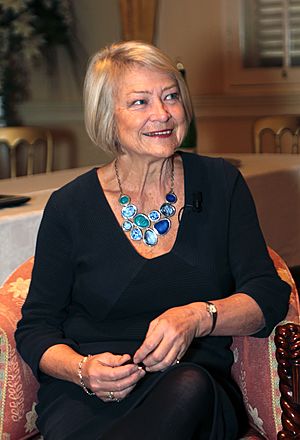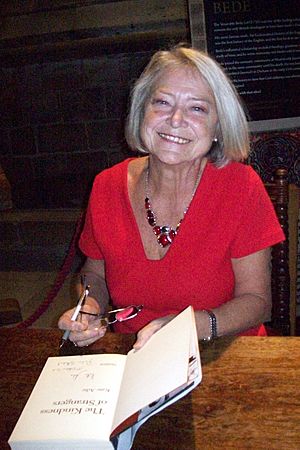Kate Adie facts for kids
Quick facts for kids
Kate Adie
CBE DL
|
|
|---|---|

Adie at the Gibraltar International Literary Festival in 2017
|
|
| Born |
Kathryn Adie
19 September 1945 Whitley Bay, Northumberland, England
|
| Education | Sunderland Church High School |
| Alma mater | University of Newcastle upon Tyne (BA) |
| Occupation | Journalist |
|
Notable credit(s)
|
Chief News Correspondent for BBC News |
| Awards | Richard Dimbleby Award (1990) Fellowship Award (2018) |
Kate Adie (born 19 September 1945) is a famous English journalist. She worked for BBC News as their main news reporter from 1989 to 2003. During this time, she reported from many dangerous places around the world.
After leaving the BBC in 2003, she became a freelance reporter. She often presents a show called From Our Own Correspondent on BBC Radio 4.
Contents
Early Life and Education
Kate Adie was born in Whitley Bay, Northumberland, England. She was adopted as a baby by John and Maud Adie, who lived in Sunderland. She grew up there.
In 1993, she met her birth mother, "Babe" Dunnet, and they had a loving relationship for over 20 years. She tried to find her birth father but was not successful.
Kate went to Sunderland Church High School. In 1963–1964, she traveled to Berlin to study German. She later earned a degree from the University of Newcastle upon Tyne. While at university, she performed in the Gilbert and Sullivan society.
A Career in Journalism
Kate Adie's journey in journalism started at BBC Radio Durham. From 1971 to 1975, she worked at Radio Bristol.
Reporting for Television
By 1977, Kate was a news reporter for BBC South in Plymouth and Southampton. In 1979, she moved to BBC national television news.
A big moment in her career happened in May 1980. She was the first reporter on the scene when the Special Air Service (SAS) ended the Iranian Embassy siege. While smoke bombs exploded and SAS soldiers rescued hostages, Kate reported live. She was crouched behind a car door, speaking without a script to a huge audience. This event made her well-known.
After this, Kate Adie often reported on major events and conflicts. These included The Troubles in Northern Ireland and the Lockerbie bombing in 1988. In 1989, she became the BBC's Chief News Correspondent, a role she held for 14 years.
Reporting from Conflict Zones
One of Kate Adie's most important assignments was reporting on the Tiananmen Square protests of 1989 in China. She was reportedly hurt when a bullet grazed her arm as she ran through the square. She later said that she and her team were the only reporters there. They witnessed "the massacre by the Chinese army of its own citizens." She stressed the importance of being there to show what happened.
Kate also reported from the Gulf War, the war in former Socialist Federal Republic of Yugoslavia, the 1994 Rwandan genocide, and the war in Sierra Leone in 2000. She became known for wearing a flak jacket and pearl earrings while reporting from dangerous places.
In Libya, she met leader Colonel Muammar Gaddafi. She was also shot by a Libyan army commander after she refused to act as a go-between for the British and Libyan governments. The bullet hit her collar bone, but she was not seriously hurt.
While in Yugoslavia, her leg was injured in Bosnia. She also met Bosnian Serb leader Radovan Karadžić.
Kate Adie's dedication to being on the spot led to a saying: "a good decision is getting on a plane at an airport where Kate Adie is getting off." This meant that if Kate Adie was leaving a place, it was probably about to become dangerous.
After the BBC
In 2003, Kate Adie retired from the BBC. She continued to work as a freelance journalist. She gives regular reports on Radio New Zealand and is a public speaker. She also appears on many episodes of From Our Own Correspondent on BBC Radio 4.
In 2017, she was a speaker at the Gibraltar International Literary Festival.
In 2018, she was honored with the Commander of the Order of the British Empire (CBE). After receiving this award, Kate Adie warned that journalism was facing challenges. She said, "We seem to be living through a time where there are threats to journalists everywhere... it's hugely important to recognise that the intention of journalism is to tell it as it is."
In 2019, Kate Adie became the Chancellor of Bournemouth University. She advised journalism students that checking information and sources is very important, especially with "fake news" around. She emphasized that "news is not news without verification."
Awards and Recognition
Kate Adie has received many awards and honors for her work:
- BAFTA Richard Dimbleby Award (1990)
- OBE (1993)
- Deputy Lieutenant of Dorset (2013)
- BAFTA Fellowship (2018)
- CBE (2018)
She also has several honorary degrees from universities like York St John University, Nottingham Trent University, and University of Bath.
Personal Life and Charity Work
Kate Adie lives in Cerne Abbas, Dorset.
She is involved with several charities. In 2017, she became an ambassador for SSAFA, the UK’s oldest military charity. She is also an ambassador for SkillForce and Farm Africa. In July 2018, she became an Ambassador for the medical charity Overseas Plastic Surgery Appeal.
Kate Adie is a fan of Sunderland AFC. In 2011, she took part in a charity event for the Sunderland A.F.C.'s Foundation of Light.
Works
- Her autobiography
See also
 In Spanish: Kate Adie para niños
In Spanish: Kate Adie para niños
 | Precious Adams |
 | Lauren Anderson |
 | Janet Collins |


